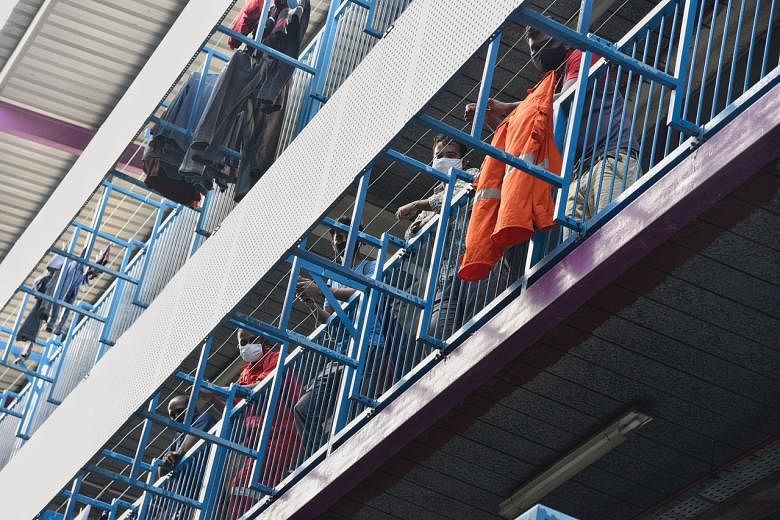SINGAPORE - A new network of medical centres being set up for migrant workers here will be tailored to meet their medical needs, including their psychological and mental well-being, Manpower Minister Tan See Leng said on Wednesday (June 30).
The aim is to provide workers with appropriate care without overtaxing the national healthcare system, he told reporters at a media briefing.
This came after The Straits Times reported on Tuesday that the Ministry of Manpower (MOM) has put out a tender seeking proposals for anchor operators to run six regional medical centres and three on-site medical centres in large dormitories that cater exclusively to migrant workers here.
Under the new system, which is expected to be rolled out as early as November, healthcare will be delivered in six geographical sectors, with each sector housing at least 40,000 migrant workers both in and out of dorms.
Each sector will be anchored by a regional medical centre, complemented by the on-site centres, at least two mobile clinical teams per sector, as well as round-the-clock telemedicine consultations and ambulance and special transport services.
Dr Tan described this as a "hub-and-spoke" model. The nine centres will succeed 13 existing centres that have been up and running since last August.
While there will be fewer medical centres in future, the scale and comprehensiveness of the centres will be significantly greater than what exists today, Dr Tan said.
For example, these centres could have built-in facilities such as a physiotherapy centre.
MOM is also looking at future-proofing these centres against new pandemics, possibly with dedicated areas for patients with a fever or acute respiratory infection, with high-efficiency air filters, for instance.
"We think that we're at an opportune inflection point where we're ready to transition into a more permanent medical support plan," Dr Tan said.
"This is a fairly significant landmark measure... In the months and quarters ahead, there will be other initiatives... as we build up this sustainability over the long haul," he added.
Dr Tan said it is also important that the cost of primary care is kept sustainable for workers, employers and the Government.
The medical centres will charge for services provided to cover their set-up and operating costs, according to the tender documents. Several suggestions for operators were outlined by MOM to keep migrant workers' out-of-pocket expenses low, while ensuring business sustainability.
Dr Tan said MOM is still exploring what the best model is, and it is too early to say if any fee benchmarks will be set. "We're going out there to do a price discovery as well."
Dr Lam Meng Chon, medical director of MOM's Assurance, Care and Engagement Group (Ace Group), said the new medical centres will complement, rather than replace or duplicate, existing primary care services, and will ensure seamless continuity of care for migrant workers.
Ace Group was formed in August last year to provide support to migrant workers and dormitory operators in the fight against Covid-19.
Workers will be automatically enrolled into a regional medical centre or an on-site medical centre, depending on their place of residence. The anchor operator of each centre will also maintain a registry of the workers in their care and ensure that there is a single clinical record for each worker throughout their care journey.
Healthcare should also be provided in a way that minimises any cultural and language barriers, Dr Lam said. This could include having on site healthcare associates from workers' home countries. These are foreign healthcare professionals who are not eligible to practise in Singapore but are qualified to perform specific tasks.
Dr Lam said the healthcare associates will be supervised by registered medical practitioners, and "focus on clinical care, like health education, basic infection prevention control measures, management of chronic diseases or conditions".
The associates could also triage cases and perform simple procedures such as dressing wounds and performing psychological first aid.
Dr Tan said these healthcare associates are not meant to replace medical professionals here, but rather will help with the psychological needs of migrant workers.
"I think it's important for them to have someone who they feel comfortable with," he said.


